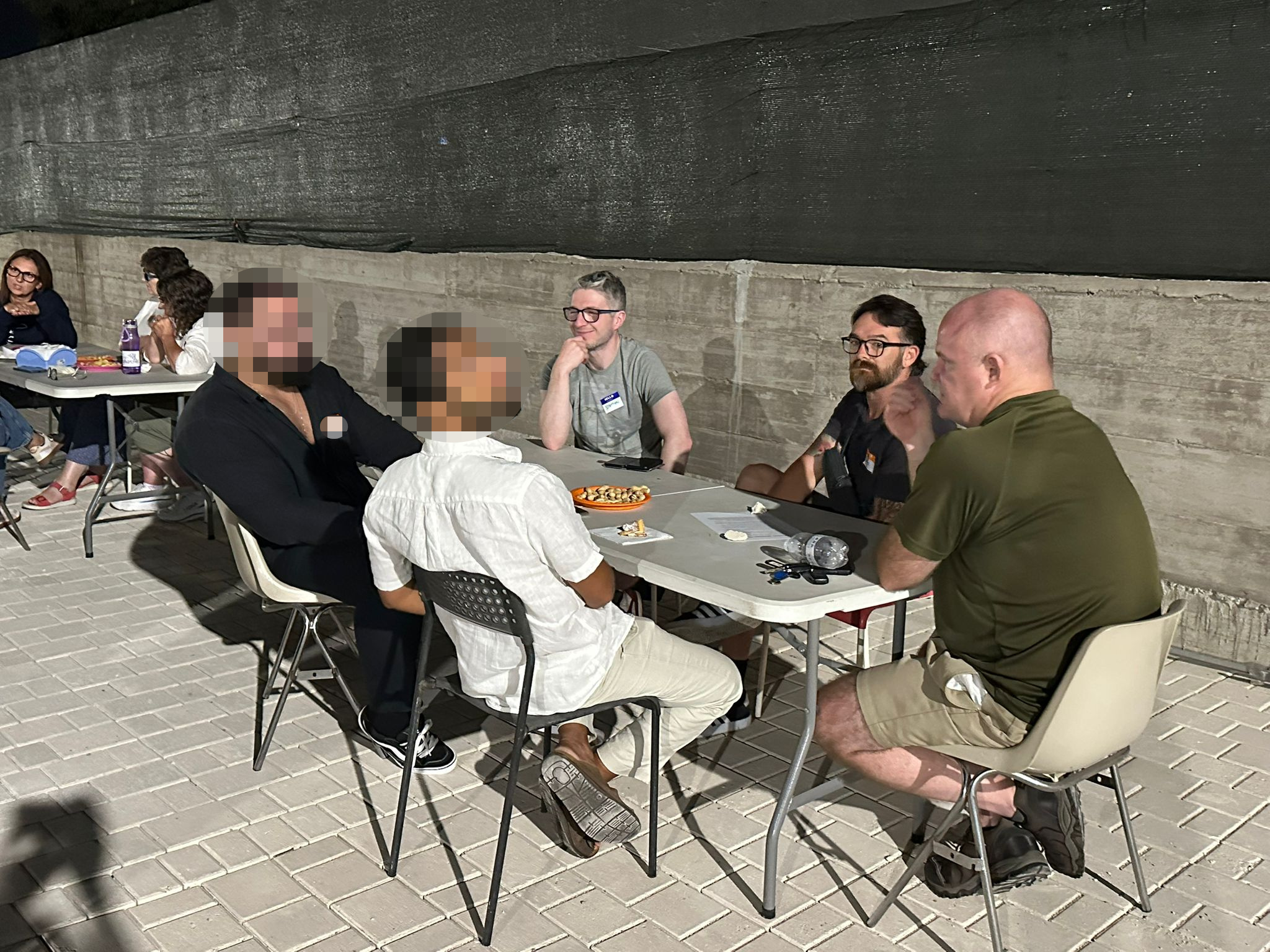Earlier this week, we went to a local church to participate in a community outreach that the church has been leading each month, speaking conversational English with community members who are interested in improving their English while speaking of topics of some spiritual depth. The partnership between the Italians and the Americans living in the area has been a great connection for our team, allowing the people to reach out to those who do not know Christ, starting new relationships in the hopes of sharing the Gospel with those who have not heard the truth about Christ.
On this particular evening, two Iranian men arrived just as we had begun the meeting and a few of us had an opportunity to sit and talk about the nature of peace with them. What does it mean to experience peace? What does peace feel like? Does peace simply mean not trying to harm one another? Or is there another type of peace that is even deeper that we can experience?

We, of course, began to soon speak of the peace that we can experience as followers of Christ. We have peace with God. We are no longer living against God, but we live for him. That which he wants to have happen, we also learn to want happen. We learn to live to make his will also to be our will. Doing this and living in this way develops a true peace within us that goes beyond simply not wanting to hurt our enemies, to do harm to another person. Instead, because of the peace that God made with us, we experience the love that he has given to us and we begin to have a desire to express that same love, extending that same peace, to other people as well.
The conversation quickly moved into some very deep and personal topics, and by the end of our time we were discussing subjects of our past and experiences that we’ve had that I wouldn’t have ever imagined as we sat down to the table that evening.
Along the way, one of the men told us that he had been pursuing Christ, reading the Bible that he had received from a smuggler in Iran who had brought the Bible into his country many years ago. But since that time, and since even coming to Sicily, he hadn’t met a believer with whom he could speak about Jesus and truly know him. He said that he believed in Jesus, but he wanted to understand more. There were many points in the Bible that he needed help to understand. That said, he confidently told us that, despite needing to know more, he believed and he wanted to believe even more.
Through the rest of the week, our team had a series of opportunities to meet with this man and his friend, explaining the Gospel, explaining why Jesus had to come and how we can repent, believe, and place our faith in him. We explained how we can respond to what Christ has done for us in baptism, demonstrating our faith through a public act and declaring Jesus, through that act of baptism, to be both our savior and our king.
Baptism at the beach
On Thursday, he was ready to move forward, so we all went to the beach, including his other self-proclaimed atheist Iranian friend with whom he was living as a roommate and a third Iranian man that we have been discipling for the last several months. We baptized our new friend in the sea on a beautiful day, including the Iranian man that we had known for a longer time, teaching him also to follow Christ, as one of the baptizers.
Following the baptism, we prayed for him and we began to celebrate. We had learned that day that our new friend’s birthday had been the day before, so we sang Happy Birthday – which of course now took on a new meaning since he was also experiencing a new birth in Christ – we ate cake and other snacks, and just enjoyed time on the beach together.
In the middle of our time of eating and talking together, our new friend and brother in Christ asked me a question that, I will admit, threw me a little off guard:
OK, now that I am baptized, does that mean that I am a Protestant?!?
He said it excitedly and I certainly didn’t want to ruin his excitement, but I had to be sure that he understood my response in as clear of a way as possible:
My friend, you were baptized in the name of the Father, the Son, and the Holy Spirit. Your baptism was to follow Jesus. Yes, people will call us evangelical Christians, but we call ourselves followers of Jesus.
He thought about that for a moment and responded very simply, “Wow, I’m really glad to hear that!”…
…and then we continued the rest of our afternoon. Thank you Lord for your help in this simple discussion and clarity in this simple discussion!
Baptism into Christ, a community, or a religion?
There is a very significant difference between being baptized into a church community, or being baptized into a denomination, or being baptized into fellowship with Christ. Just recently I heard a story of a local church that was forcing people who had been following Jesus for more than 20 years and who had recently moved to the area and joined that particular church, that they must now be baptized again into their community. What was the message? Both literally and figuratively they were saying, “This is the true church. We are the true believers. You must join us and be baptized into our church if you want to truly be saved.”
On the other hand, I have also known people – in fact, many people! – that have joined a church because they liked the community that they found within the church. They enjoyed the music and the “inspirational messages” that they hear preached in the church. They enjoyed the feelings that they feel when they enter into that community and meet together with the other people each Sunday. And so they believe that their baptism is a baptism into community of believers. It seems that their discussions about their faith often come with with a greater emphasis of belonging to the community and being identified by a particular name – I am an evangelical! – than their belonging to the one that to whom that community is intended to worship, Christ himself.
The Consequences
There are, of course, multiple problems with this belief or the mindset that we find in these cases, but one of the greatest difficulties is that disappointment will soon come. Someone will do something to hurt you. Someone will intentionally or unintentionally wound you. And with disappointment, anger and resentment eventually set in. Soon, you no longer want to be connected with that community. Soon, you no longer want to be connected with that denomination, or that religion, and instead, you walk away, determined to not be hurt any longer. Maybe you continue to say that you are part of that denomination, or you are part of that religion, or maybe, as I hear so frequently from many people these days, you call yourself an atheist. You thought that you were connected to God, but now that the disappointment and the hurt have come, you are not interested in God any longer. You thought that you were on the right track, but if God is truly like what you have experienced, you are no longer interested.
There is a significant difference in a true relationship with God through Christ and a false relationship with God because you thought that you were connected with him as a result of being involved in a religion. In a religion, you are weighed down by the rules and you keep trying to be “good enough” that God will be happy with you. It seems like everyone else is able to do it, but you are trying to be honest with yourself and you realize that you will just never be good enough. So you reject God. You reject the religion, and you live your life having walked away from that religion, having walked away from what you thought was your relationship with God.
On the other hand, if you have a relationship with God through Christ, you realize that he already knew that you would never be good enough. God knew this and still made a plan to save you anyway. He wasn’t angry with you. He was patient with you, calling you back to himself and waited for you to respond. He waited for you, not wanting to bring his wrath upon you, but instead desired to extend his grace and mercy to you. And now you live for him, giving your life to him because of the love that God showed to you in Christ, even though you were, at the time, acting as his enemy. You were completely against him, but now, despite all that you had done, he loves you and now you live for him.
Those are two completely different ways of understanding God, and yet we can very often confuse them and, in some fashion, fuse the ideas together. One way leads us into direct relationship with God, helping us to understand our identity – answering the question Who am I? – and helping us to understand our purpose – answering questions like Why am I here? or What was I made to do? The other way simply brings disappointment because it is simply based on human relationships or human structures that attempt to help us know God is some way. The first way allows true fulfillment, satisfaction, and peace with God. The second is simply destined to fail.
As we seek to know God, we must look for him in Christ. Yes, we walk this path with our church communities, but our communities are not God. Neither the community, nor any one leader within the community is the path to know God. We cannot find him in a denomination. We cannot find him in a religious system. We can find God only in Christ, the true image of God, following him wherever he will lead us.








